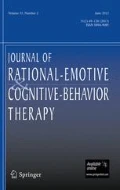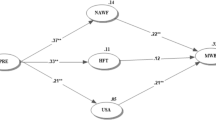Abstract
In this interview, Ellis acknowledges that irrational beliefs have a higher biological basis than rational beliefs and that they are not at opposite ends of the same continuum. Ellis agrees that irrational beliefs are more involved in mental health problems while rational beliefs contribute to the psychology of success. The strength of conviction in both rational and irrational beliefs including self-acceptance and self-downing is explored. Ellis equates the conviction with which rational beliefs need to be held to influence emotions and behaviors with “faith.” He acknowledges the importance of faith built on facts rather than religiosity. Ellis agrees that ridding strongly motivated individuals of self-depreciation may lead to a decrease in their high frustration tolerance and, ultimately, their drive for and achievement of success. Ellis supports adding an “F” to the ABCDE model—forcefully agreeing with and applying new rational beliefs. Ellis discusses the need to develop a literature on therapeutic techniques and methods for helping people to apply rational beliefs more strongly to different areas of their lives. Ellis highlights the perils of self-efficacy positive psychology interventions if people’s innate tendency towards self-depreciation is ignored. The interviewer concludes the interview expressing the view that if we listen to Ellis, “we” need to re-think the ways we teach people of all ages to think rationally knowing that the rational re-statement of previously disputed irrational beliefs is only one of many different teaching methods.
Similar content being viewed by others
Author information
Authors and Affiliations
Corresponding author
Additional information
This interview was conducted in January, 2005, at the Albert Ellis Institute. At the time of the interview, Dr. Ellis was in good health. In this interview held over two separate sessions, a series of questions prepared by the interviewer were presented to Albert Ellis that were designed to stimulate discussion on differences between rational and irrational beliefs and on the issue of whether once irrational beliefs have been disputed, more time and REBT methods need to be devoted to helping clients strengthen their conviction in and application of rational beliefs.
Rights and permissions
About this article
Cite this article
Bernard, M.E. Dispute Irrational Beliefs and Teach Rational Beliefs: An Interview with Albert Ellis. J Rat-Emo Cognitive-Behav Ther 27, 66–76 (2009). https://doi.org/10.1007/s10942-009-0089-x
Published:
Issue Date:
DOI: https://doi.org/10.1007/s10942-009-0089-x




